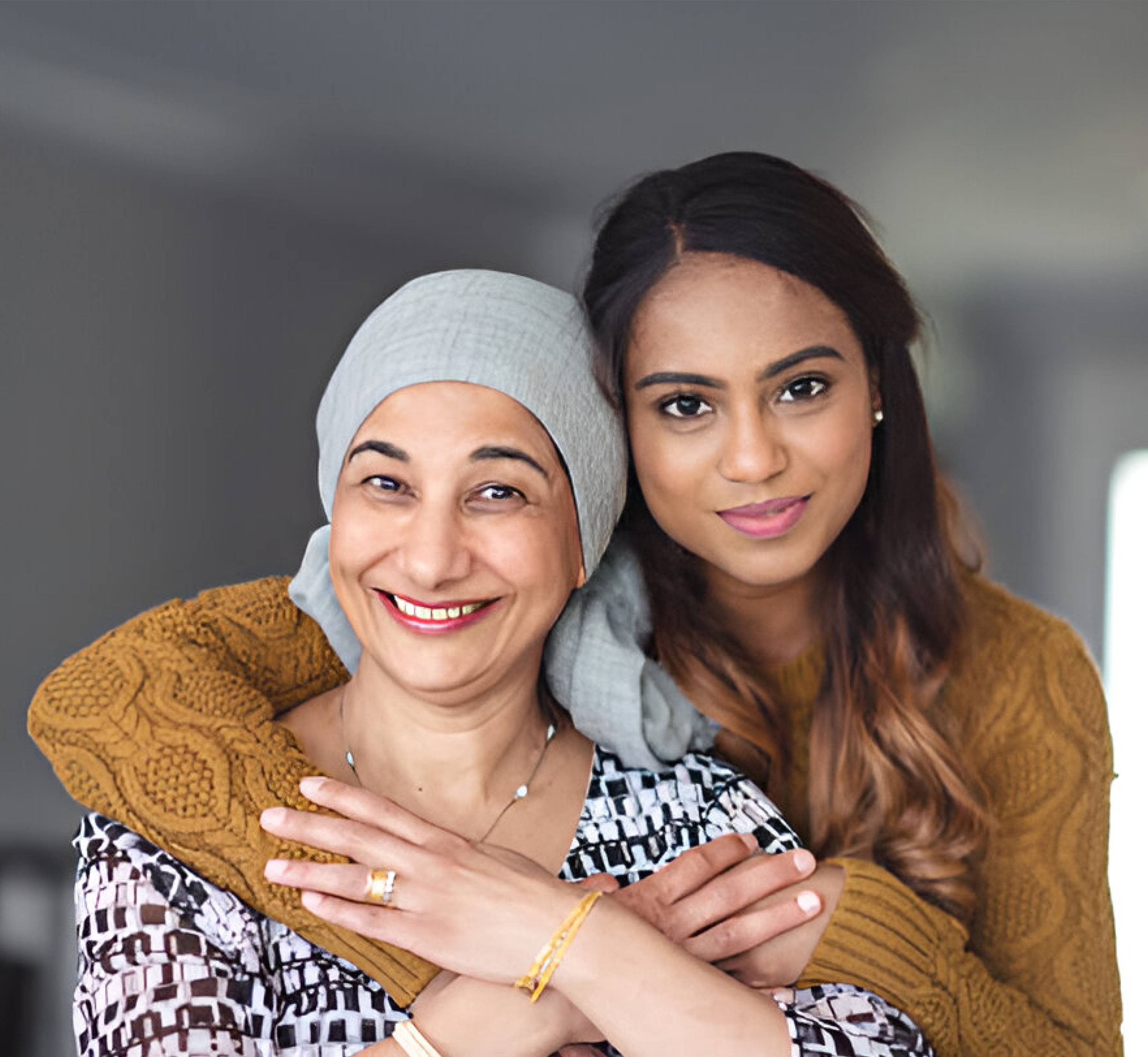 Book Appt.
Book Appt.
 Call Now
Call Now


Introduction
Targeted therapy is a kind of cancer treatment that’s focused on genetic changes or mutations that turn healthy cells into cancer cells. To use targeted therapy, healthcare providers test for the genetic changes responsible for helping cancer cells grow and survive. Then, they identify specific treatments to kill those cells or keep them from growing. Targeted therapy helps healthcare providers treat cancer cells without hurting healthy cells. Healthcare providers have developed more than 80 targeted therapies to treat many kinds of cancer. Sometimes, they use targeted therapy as the front line or initial treatment. They may also combine targeted therapy with other treatments.
Once healthcare providers understand the genetic mutation that transforms a healthy cell into a cancer cell, they can target specific cancer cell sections for treatment. These are sometimes used as targets on cancer cells' surfaces. Other times, the targets are chemicals found within cancer cells. The two most frequent types of targeted therapies and how they treat cancer are monoclonal antibodies and small-molecule medicines.
Targeted therapies treat all types of cancer
Healthcare practitioners have created over 80 targeted therapies to treat various types of cancer. They've also developed targeted medicines to treat distinct mutations associated with the same type of cancer. Cancers that can be treated with targeted therapy include blood cancers, brain malignancies, bone and soft tissue cancers, breast cancers, digestive system cancers, head and neck cancers, lung cancers, skin cancers, thyroid cancers, and urinary system cancers.
Targeted therapy is a highly effective treatment, although it does not always work. Identifying a target for therapy is a complex process that necessitates healthcare personnel gathering extensive information about a malignancy. It's a difficult process, and healthcare experts are still discovering how to make it more effective.
Procedure
Before the procedure
Your healthcare professional will determine whether targeted therapy is the best treatment option for your specific cancer kind. Your healthcare professional may need to test your blood or tissue samples obtained through biopsies. They will seek for specific gene changes or mutations in the samples to identify targets that are likely to respond to specific medicines.
During the procedure
Every circumstance is unique, so ask your healthcare professional to describe your treatment plan so you know what to expect. Here's some broad information on what might occur during targeted therapy:
Targeted therapy can be administered as a tablet, an injection beneath the skin (subcutaneously), or by an IV. People who receive IV therapy often visit their doctor's office or an outpatient treatment centre.
You may receive targeted therapy in conjunction with other treatments, such as chemotherapy or radiation therapy.
You could get targeted therapy every day, once a week, several times a week, once a month, or less frequently.
There may be times when you take a break from therapy.
You’ll have regular visits with your healthcare provider so they can monitor your progress. They may perform blood tests, X-rays, computed tomography (CT) scans, and other tests to assess how well the targeted therapy is working. They’ll also ask how you’re doing with any treatment side effects.
Benefits
The primary advantage of targeted therapy is its ability to kill cancer cells while sparing healthy cells. It can help prevent cancer cells from spreading. When previous treatments have proven ineffective, healthcare experts may propose targeted therapies.
Side effects
Side effects from targeted therapy vary depending on the substance. Possible side effects include diarrhea, elevated liver enzymes, cardiotoxicity, dry skin, extreme sensitivity to ultraviolet (UV) light (photosensitivity), high blood pressure, hair color loss, nail changes, wound healing and blood clotting issues, skin rash, interstitial lung disease, heart rhythm changes, and neurologic changes.
Conclusion
Targeted medicines for primary immunodeficiency disorders (PIDs) constitute a significant development in medical treatment. These therapies, including gene therapy, monoclonal antibodies, enzyme replacement therapy, cytokine therapy, and small molecule inhibitors, are aimed to address the specific genetic or molecular flaws causing immunological failure in PIDs.
SHALBY Sanar International Hospitals provides extensive medical procedures backed up with our state-of-the-art technology and a team of highly qualified & experienced clinical experts.

Grade 2 Endometrium Cancer | Ms. Robiyakhon | Uzbekistan | Dr. Archit Pandit | SHALBY Sanar

Male Breast Cancer Recovery Story | Dr. Archit Pandit | Cameroon | SHALBY Sanar

Ms. Nafisa’s Inspiring Breast Cancer Recovery | Dr. Archit Pandit | Uzbekistan | SHALBY Sanar International Hospitals

Stage4 colon cancer is curable - Colon cancer with liver metastasis | Kenya | Dr Archit Pandit

Patient from Kenya Treated by Dr. Archit Pandit | SHALBY Sanar International Hospitals

Double Cancer Victory: Mrs. Salma Kapoor's Inspiring Recovery Story | Dr. Archit Pandit

Patient from Uzbekistan Treated by Dr. Archit Pandit | SHALBY Sanar International Hospitals

Patient from Uzbekistan Treated by Dr. Archit Pandit | SHALBY Sanar International Hospitals

Successful Carcinoma Buccal Mucosa Surgery of a Patient from Nigeria by Dr. Archit Pandit

Successful Colon Cancer Surgery of Mr. Faraidun Kaka Bra Amin Amin's from Iraq | Dr Archit Pandit

Miraculous Recovery of a patient from Uzbekistan battling Ovarian Cancer | Dr. Archit Pandit

Successful Cancer Detection & Surgery by Dr. Archit Pandit | SHALBY SHALBY Sanar International Hospitals

Successful Colon Cancer Treatment of a patient from Iraq by Dr Archit Pandit | Surgical Oncology

Successful Glottis Mass & Carcinoma Vocal Cord Treatment of a patient from Iraq by Dr Archit Pandit

Successful Stage 4 Colon Cancer Treatment of a patient from Kenya by Dr Archit Pandit

Surviving the Odds: 56-Year-Old's Journey with Recurrent Carcinoma Vocal Cord | Dr. Archit Pandit

Surviving Recto-Sigmoid Cancer: Mr. Syamand Ahmed's Inspiring Journey

Success Story: Iraqi Patient's Liver Tumour Treatment at SHALBY Sanar International Hospitals

Cytoreductive Surgery Success: Iraqi Patient's 30cm Ovarian Tumor Removed Safely

Beating Liver Cancer: Mr. Abdirashid's Inspiring Story

Ms. Nejood's Success Over Pancreatic Cancer: A Remarkable Journey

Transforming Smiles: Revolutionary Buccal Commando Procedure

Wide Local Excision Surgery & Microvascular Reconstruction of a Cancer patient

Successful Surgery of Esophgeal Cancer

Successful Lung Cancer Surgery of Ms. Jerioth Wanjiru from Kenya

Para Thyroidectomy on Pt Jawad Kadhim Tweli from Iraq

Dr Archit Pandit discusses the fascinating case of Geeta Rani
Our doctors pen down their research findings and experiences from time to time. Their words provide deep insight into the latest techniques, technologies and other advancements in healthcare. It provides expert answers to all kinds of health questions for real-life issues.
VIEW ALL




Since the day of its foundation, SHALBY Sanar International Hospitals is committed to provide comprehensive healthcare services. It regularly organizes awareness programs in its premises and encourages outdoor healthcare activities and camps with an intent to put focus on preventive healthcare.
VIEW ALL